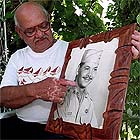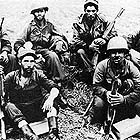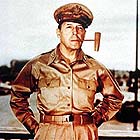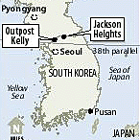|
 |
|
Esta página no está disponible en español. The Hartford CourantNew Generation Fights For 65thBy MATTHEW HAY BROWN | ||||||||||||||||
| . | ||
 |
 |
 |
| Looking back. (HUMBERTO TRIAS FOR The Hartford Courant) |
Band of brothers. (COURTESY OF U.S. ARMY) |
Gen. Douglas MacArthur. (The Hartford Courant ) |
| . | ||
The men of Company L paused. Only weeks earlier, their regiment had been routed in the bloody battle for Outpost Kelly. They had not yet shaken the trauma of that slaughter -- the mortal screams of their friends and the sight, later, of what was left of their bodies: eyes gouged out of faces, limbs hacked from torsos.
In the aftermath of that defeat, the 3rd Division leadership relieved the regimental commander with whom many had trained. The new colonel ordered the soldiers to shave their mustaches until they proved their manhood, and made some of them wear signs that read "I am a coward."
Wasson was calling them back into danger.
The men walked away. Back to their regiment -- and on to military prison, with a few of the 91 soldiers sentenced to years of hard labor for refusing to fight in the weeks after the battle for Outpost Kelly.
It would be the largest mass court-martial of the Korean War.
Now, 50 years later, a younger generation is campaigning to restore the once-celebrated name of the 65th. They blame the soldiers' disobedience not on cowardice but on a lack of training, poor leadership and simple racial prejudice. They say the unit was singled out for prosecution because its members were Puerto Rican .
Bolstered by a new Army review that largely affirms their arguments, and supported by a growing number of politicians on the island and in Congress, they are calling on President Bush to exonerate the court-martialed soldiers.
"It's left a scar on the honor of the Puerto Rican people," says Ernest Acosta Jr., director of the Puerto Rican -American Research Institute. "We're just trying to set the record straight."
Pride And Courage
Once, la Sesenta y Cinco was the pride of this U.S. territory, a rare institution in which Puerto Ricans could express patriotism for their island while arguing for their place within the larger United States.
"Those soldiers embodied the very Criollo tradition of courage," says Silvia Alvarez-Curbelo, a historian at the University of Puerto Rico . "They were a distinct symbol of the relationship between colony and empire, based on loyalty and service but with a high degree of pride and dignity."
In the early years, they were given little opportunity to show it. But after whiling away all of World War I and most of World War II guarding the Panama Canal, they were thrown into action in Korea.
Christened the Borinqueneers -- from the native Taino word for their Caribbean homeland -- they hit the ground fighting. By the end of their first year, they had been credited with 15,787 enemy killed in action, more than 10 times their own casualty rate. Members had won four Distinguished Service Crosses and 125 Silver Stars -- and the praise of the Far East Command.
"The Puerto Ricans forming the ranks of the gallant 65th Infantry give daily proof on the battlefields of Korea of their courage, determination and resolute will to victory, their invincible loyalty to the United States and their fervent devotion to those immutable principles of human relations which the Americans of the Continent and Puerto Rico have in common," Gen. Douglas MacArthur wrote in 1951. "They are writing a brilliant record of heroism in battle and I am indeed proud to have them under my command. I wish that we could count on many more like them."
Defining Battle
Then came the battle for Outpost Kelly. Elements of the 65th held the bare hill forward of the main U.S. line in September 1952 when the Chinese slammed in, driving the Puerto Ricans off. Twice, the troops clawed their way back, only to be overwhelmed each time by Chinese artillery.
 ----------
----------
Outpost Kelly and Jackson Heights, Korea
(KNIGHT RIDDER TRIBUNE)
----------
Sergio Lopez de Lopez, a 23-year-old private, was among those called to climb Kelly.
"Thirty-eight men went up," he remembers. "Three came down."
By the end of September, Kelly was in enemy hands, the 65th had suffered 542 casualties and the Eighth Army command was ordering changes. Col. Juan Cesar Cordero Davila, the highest-ranking Puerto Rican in the Army, was replaced as regimental commander by Col. Chester B. DeGavre, a West Point graduate and a "continental," a white officer from the mainland United States.
DeGavre stripped the name Borinqueneers from the unit. He cut special rations of rice and beans. But what veterans remember most was his order that they shave their mustaches "until such a time as they gave proof of their manhood."
"Mine had to go also, after 22 years with me," wrote Maj. Silvestre E. Ortiz, the regimental adjutant. "All that the mustache means to a Puerto Rican , it is part of his personality, in many cases the product of a religious vow, so much so that the three chaplains went to visit this gentleman and apprised him of its importance, unsuccessfully."
Barely a month after Kelly, soldiers of the 65th found themselves under fire again, now on an exposed rock slope in the no-man's land between the Chinese and U.S. lines called Jackson Heights. For two days, the Chinese alternated pounding the outpost with heavy artillery and probing the wreckage with patrols.
Then they overran the position, but the Puerto Ricans fought back, retaking the hill briefly before fleeing under fire.
On the third day of battle, with casualties rising, 80 men from the 65th gathered away from Jackson Heights and were refusing orders to go back. The next day, more soldiers dropped out of the fighting. Finally, the unit was ordered away from the outpost, back to the main U.S. line.
By the end of October, the 65th had suffered 259 more casualties, most of them at Jackson Heights. In the aftermath, 123 men were charged with disobeying orders. In early November, a platoon of Company L was on patrol when 39 more men refused to follow Wasson across the river.
They, too, were arrested.
One hundred and sixty-two Puerto Ricans crowded the division stockade. The courts-martial began in December. Ninety-five soldiers were tried. Ninety-one were found guilty and sentenced to prison terms ranging from one to 18 years of hard labor.
The news reached Puerto Rico and the mainland in early 1953. Families, Congress and the press demanded explanations. "Nuestros hijos no son cobardes!" the San Juan newspaper el Imparcial protested in one headline: "Our sons are not cowards!"
Under growing pressure, the Pentagon responded. In February 1953, Army Chief of Staff Gen. J. Lawton Collins told the House Armed Services Committee that the 65th had distinguished itself in battle but had broken down as a result of inexperienced officers and the inability of the troops to speak English.
"The Puerto Ricans have proven in action in early fighting in Korea that they are a gallant people and that they will fight just as well as anyone else if they are properly trained and properly led," Collins said.
Language difficulties became the official explanation for the failure of the 65th, and U.S. Army Secretary Robert Stevens moved quickly to overturn the sentences. By 1954, all of the soldiers had been granted clemency or pardon; most were reinstated to service.
Meanwhile, the Army was reconstituting the regiment, with continental soldiers assigned in the same proportion as in other units. By the end of spring, the unit had lost its Puerto Rican identity. The Borinqueneers faded into history, little known to subsequent generations of Puerto Ricans .
Something Wrong
Ernest Acosta Jr. did not know of the regiment in 1995 when he happened upon a copy " Puerto Rico 's Fighting 65th U.S. Infantry." Retired Gen. W.W. Harris, commander of the regiment during its first year in Korea, called his men "the best damned soldiers in that war." Rotated out of command before Outpost Kelly and Jackson Heights, Harris avoided mention of the courts-martial.
Acosta, a computer systems analyst for the federal government, had founded the Puerto Rican -American Research Institute years earlier to respond to negative images of Puerto Ricans in the media. A peacetime veteran of the Army himself, the Maryland man prevailed on U.S. Rep. Nydia Velazquez, D-N.Y., to introduce bills to recognize and honor the 65th. Then, at a 1998 conference of the National Puerto Rican Coalition in Washington, someone mentioned the courts-martial.
"Knowing what we knew about the 65th, something seemed wrong here," Acosta remembers. "How could soldiers that had been so highly praised suddenly be court-martialed in such high numbers? Something must have happened."
Working with friends Guillermo Rodriguez and Baltazar Soto, Army colonels whose fathers had been at Jackson Heights, he pored over yellowing military records, newspaper stories and letters written by soldiers. After reading of the accomplishments of the 65th, the disaster at Outpost Kelly and the humiliation of the men by DeGavre, they asked Army Secretary Louis Caldera in 1999 to review the courts- martial. Caldera referred the project to the Center for Military History.
The Army report, released last year, blames the breakdown of the 65th on a shortage of officers and noncommissioned officers, a rotation policy that removed combat-experienced leaders and soldiers, tactics that led to high casualties, an ammunition shortage, communication problems between largely white, English- speaking officers and Spanish-speaking Puerto Rican enlisted men, and declining morale.
"The heavy cumulative effects of all these influences ... was simply too great a burden for the 65th to bear," the report concludes. "It is a tribute to the dedication and perseverance of the men of the 65th that, in light of all this, they attacked as many times as they did and were able to advance as far as they did. ... As happens too often in war, they were let down by their leaders at all levels."
Army report finds bias
The report also finds bias in the prosecution of the Puerto Ricans , citing instances of continental soldiers who were not charged after refusing to fight in similar circumstances, before and after Jackson Heights.
Believing the convictions and subsequent pardons and clemency still taint the soldiers with guilt, Acosta is using the report to campaign for formal exoneration -- a declaration of their innocence.
That campaign is gaining support. Resident Commissioner Anibal Acevedo Vila last month asked Bush "to correct a historic injustice committed by the U.S. Army against a group of brave Puerto Ricans ."
Gov. Sila M. Calderon also has lent her support, saying it is the policy of her administration "to recognize the valor and the honorable service realized by the 65th Infantry in the North American wars."
Acosta and Rodriguez planned to meet with Acevedo to discuss strategy for a campaign that would involve the Puerto Rican members of Congress to urge Bush to take action.
Acosta sees the experience of the 65th as one of several long- festering resentments now gaining attention, including naval practice bombing on Vieques , images of Puerto Ricans presented in the often-produced musical "West Side Story" and the still- unresolved question of the island's political status in relation to the United States.
"The Puerto Rican community is finally coming of age, it's finally beginning to protest," he says. "The community wants equality. It wants to be treated like everyone else."
Sergio Lopez de Lopez is reluctant to talk about his wartime experiences. Lying awake at night, he remembers the human gore that littered Outpost Kelly, the hacked-off arms and legs of his friends and comrades.
The retired printer sips a Coke in his cool, comfortable one- story home in the Puerto Rican interior. Virginia Aviles Robles, the woman he married two weeks before shipping out to Korea, prepares dinner; their granddaughters play in the driveway out front. A hand- tinted portrait of the soldier as a young man, taken before Outpost Kelly, dominates the front hall.
"It's still difficult to think of these things," he says. "I know so many people who were killed like animals."
Surviving court-martialed veterans have not been closely involved in the drive for exoneration. Francisco Alicea, president of the 65th Infantry Veterans and Retirees Association in San Juan, says the 225-member organization supports the effort, but has little information about Outpost Kelly, Jackson Heights or the courts- martial.
'It's already been 50 years'
Lopez was court-martialed for refusing to follow Wasson across the river. He was sentenced to two years of hard labor and dishonorable discharge, then pardoned, freed and reinstated six months later.
He says now that exoneration is "not so important."
"It would be something," he said. "But it's already been 50 years. All those years we suffered."
Alvarez-Curbelo, the historian, says there still is value to revisiting the 65th.
"It's never too late for justice," she says.
"You have to revisit the past. Not for wanting to find the guilty or the innocent or anything like that, but to have a clear picture of who you are. You have to go to the past."
|
|
|
|
|
|
